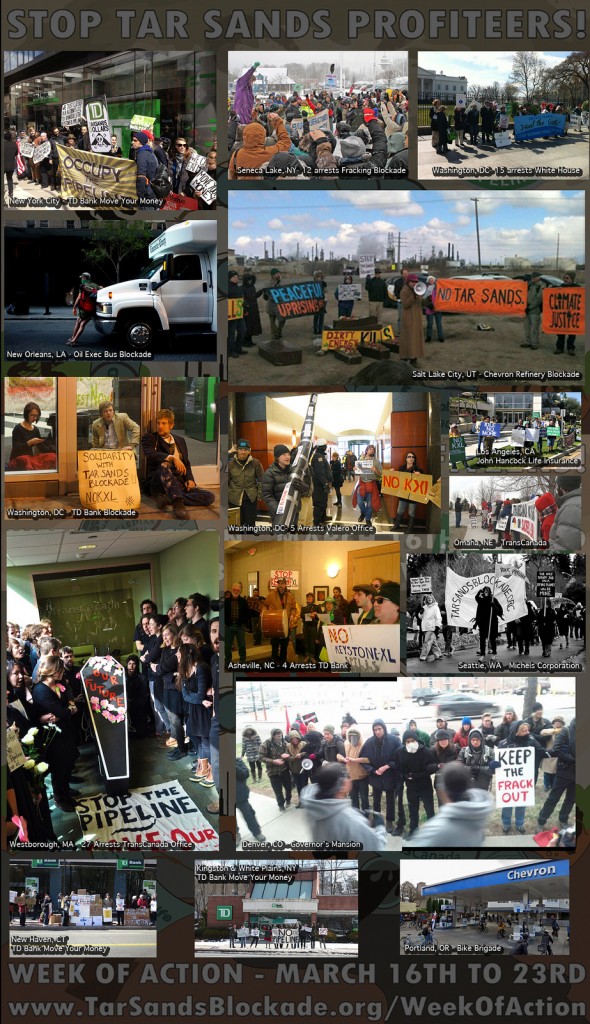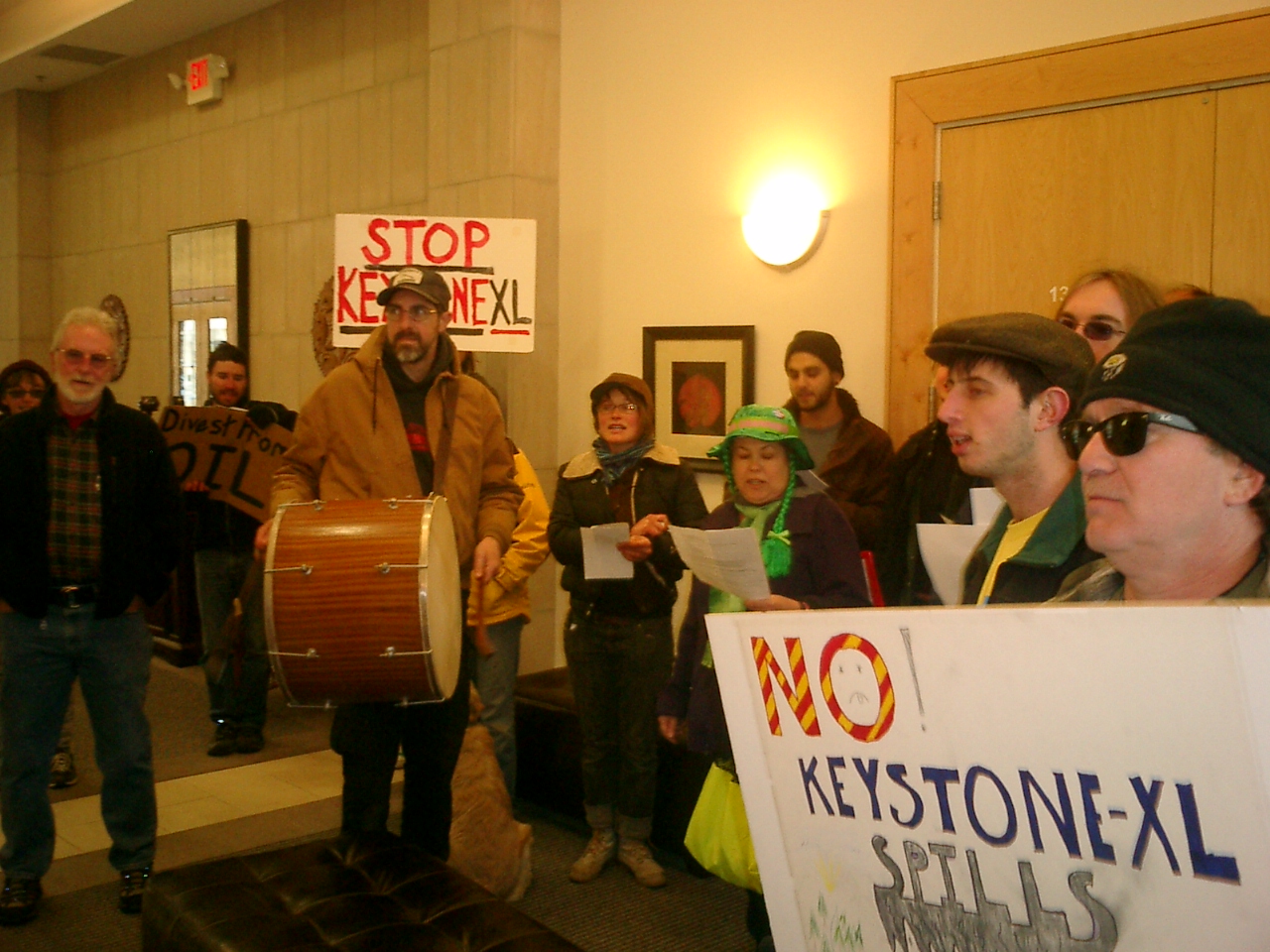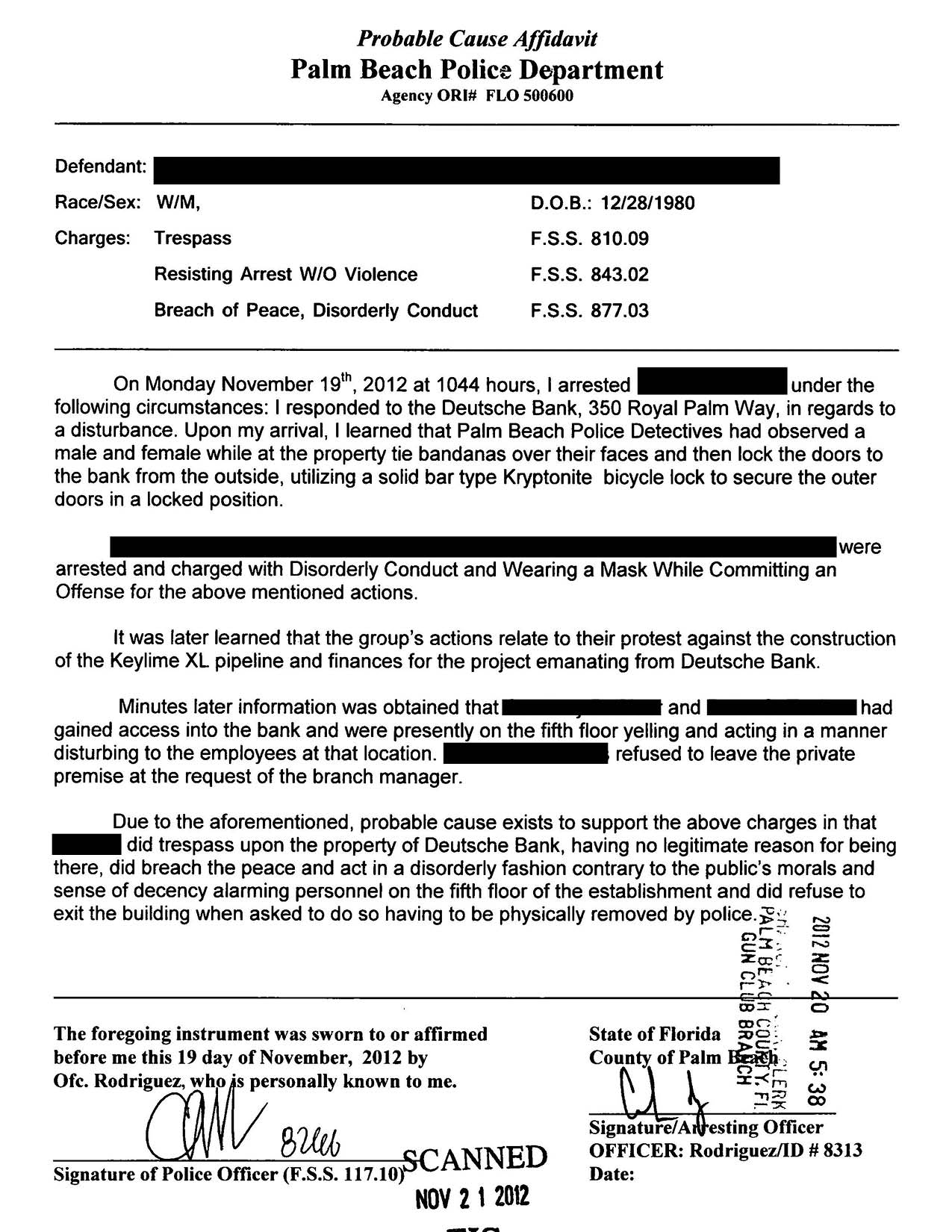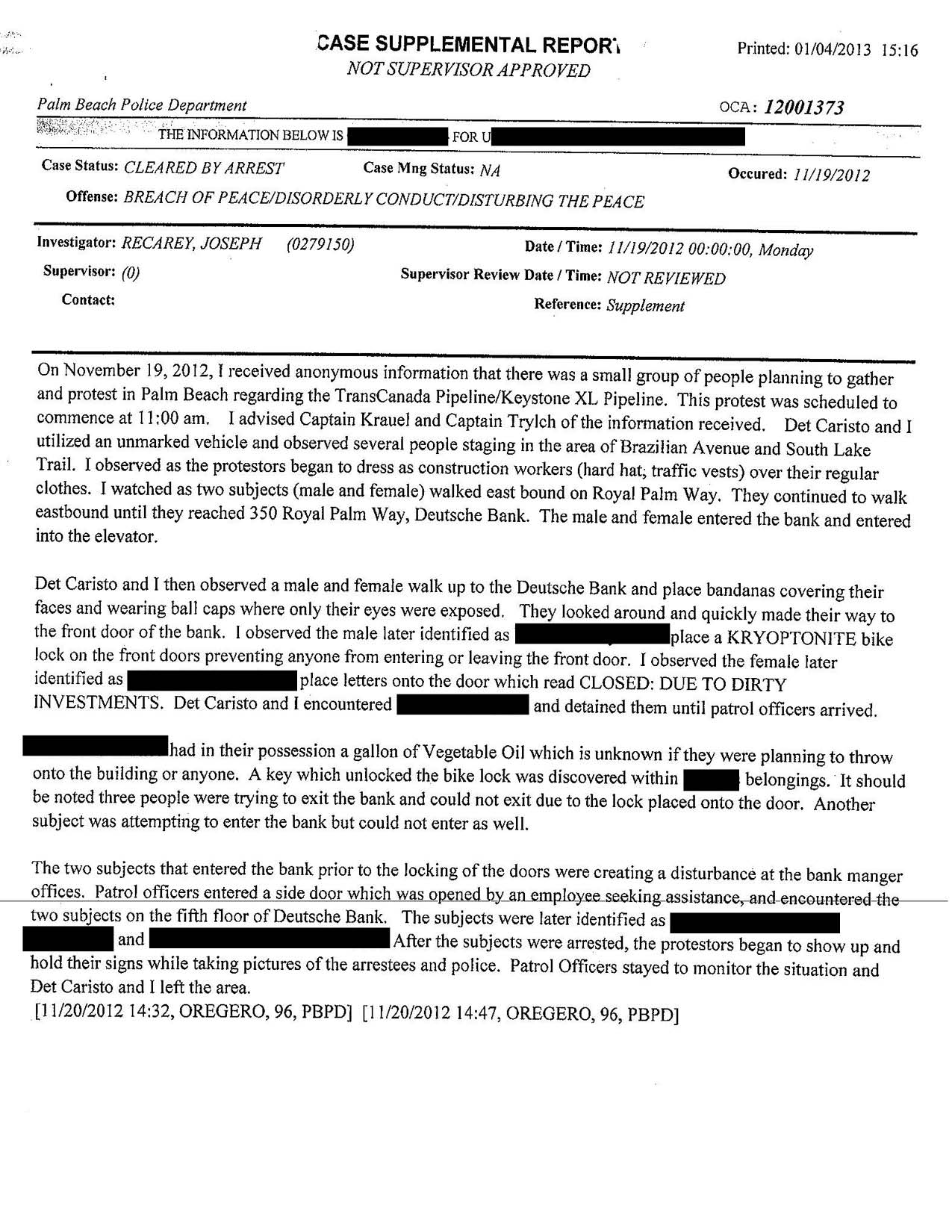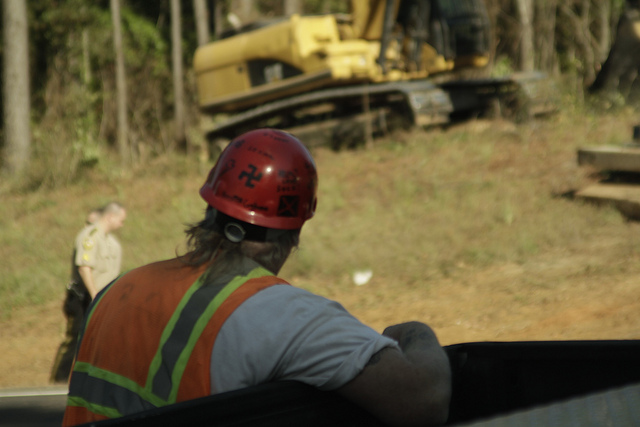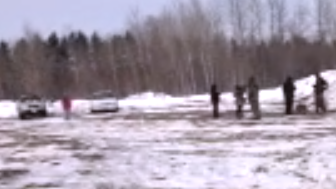As some of the last five of over 70 massive parts of an Alberta tar sands upgrader plant rumbled through the small, quiet, college town of Moscow, Idaho, at about 11 pm on Sunday, March 4, four protesters linked arms and sat down in the middle of Washington Street to stop three of these “megaloads” weighing 200,000 to 415,000 pounds and measuring 150 to 200 feet long.
Police arrested Cass Davis and Jim Prall for resisting and obstructing officers and dragged Jeanne McHale and Pat Monger to the sidewalk, as another 40 protesters voiced their opposition to expanding tar sands mining operations. Again on Tuesday, March 6, when the final two similarly huge shipments crossed this 22,000-person city, demonstrators pounded drums, chanted slogans, played music, and engaged in street theater.
Helen Yost tossed a cardboard protest sign at the rear of the last megaload and air-kicked the transports and their police escorts out of town, resulting in misdemeanor charges for throwing an object at a moving highway vehicle and attempted battery of a peace officer.
All three accused protesters are pleading not guilty based on the necessity of their actions induced by their moral obligation to directly confront the causes of climate change that are currently killing millions of people, plants, and animals around the globe. For their statements, please listen to Cass Davis and Jim Prall on Flashpoints and Helen Yost on KRFP Radio Free Moscow. Other articles, photos, and videos of numerous megaload passages and protests are available on the Wild Idaho Rising Tide (WIRT) facebook page and website.
At about forty direct actions since July 15, 2011, when the shipments started traversing two-lane Highway 95 several nights a week, WIRT members and their community have practiced simple acts of non-violent civil disobedience to draw Americans’ attention to ongoing crimes against nature and humanity perpetrated by one of the wealthiest corporations in the world, ExxonMobil, and its Canadian subsidiary, Imperial Oil.
Their struggle began in May 2010, when Idaho citizens first learned that Governor Butch Otter and the Idaho Transportation Department had promised easy Idaho passage of at least 207 Korean-built modules to booming tar sands operations in Canada. Thirty four pieces of cheaply constructed equipment destined for the Kearl Oil Sands Project in northeastern Alberta arrived in October 2010 by barge at the Port of Lewiston, Idaho, 465 river miles inland from the Pacific Ocean. ExxonMobil/Imperial Oil originally intended to transport these megaloads through the Clearwater and Lochsa River valleys, up a 216-mile stretch of Highway 12 between Lewiston and Missoula, Montana.
This wild and pristine route through the largest wilderness complex in the lower 48 states encompasses not a single overpass that would prevent passage of these gigantic components weighing up to 600,000 pounds, towering 30 feet tall, and crowding the winding, two-lane road with their 24-foot widths and over 200-foot lengths. Among the first three National Scenic Byways and one of only 31 All-American Roads, Highway 12 runs through a Wild and Scenic River federal easement and carries national historic significance as the parallel river route of the Nez Perce and Lewis and Clark trails. These designations and the untrammeled nature of the place foster a vibrant, local, tourism industry that has flourished even while the national economy has floundered.
But Big Oil and its corporate interest in Highway 12 and other narrow, rural roadways in Idaho and Montana as permanent, high and wide, industrial corridors to the tar sands naively stumbled into an ambush in this rugged country. Since August 2010, regional citizens have challenged, delayed, and possibly permanently impeded Imperial Oil’s plans, through four administrative and district court cases in both states and an Idaho Supreme Court hearing. The one ‘test validation module’ that did traverse Highway 12 in April 2011 has remained stranded at Lolo Pass, high in the Bitterroot Mountains, protected from local scorn by ongoing private security, in mute testament to effective litigation and corporate folly. During 2011, less than a dozen other transports with similar dimensions belonging to other companies attempted this arduous course.
In January 2011, Imperial Oil began spending $17 million to split its modules previously certified as “irreducible in size” into pieces only 15 feet high for transport on Highway 95 north from the port to Interstates 90 and 15 and Canada. As residents raged in the streets of Moscow during over forty protests since Highway 95 shipments commenced in mid-July 2011, ExxonMobil shifted its transportation plans in October 2011 to the Port of Pasco and Highway 395 in eastern Washington. In February 2012, in a lawsuit initiated by Missoula County Commissioners, a Montana judge modified a temporary court injunction into a permanent stay, effectively barring Imperial Oil traffic on Highway 12 until the Montana Department of Transportation produces a more thorough review of potential project impacts.
Since the Idaho Transportation Department first granted overlegal load permits for these unwelcome behemoths on February 1, 2011, most state and local officials have complicitly assented to Imperial Oil’s use of Moscow’s beautiful tree-lined streets and north Idaho’s winding rural roads as industrial corridors to the 232-square-mile complex of Canadian tar sands mines considered the “the most destructive project on earth[1]”. The moral outrage of impacted citizens has swelled over almost two years, as spirited demonstrations have confronted every passage of these Imperial Oil transports hauled by Mammoet and their overbearing convoys of industry paid state, county, and city police and contracted pilot vehicle drivers and flaggers. On August 26, about 150 protesters filled the streets and six citizens were arrested when they stopped a megaload for nearly half an hour. Two shipment monitors were targeted and jailed on the following night, and two bicyclists riding on sidewalks near the transports were unlawfully detained and charged on October 6.
Myriad offensive social and environmental injustices have already and will continue to result from this transportation project, which hastens the Alberta tar sands development that climate scientist James Hansen has warned would ensure “game over for the climate.[2]” Alberta upgrader plants release substantial carbon dioxide, greenhouse gases, heavy metals, and even the dirty tar mixture called bitumen that they process. Energy- and water-intensive mining and upgrading processes release toxic emissions and wastewater stews that fill vast lagoons. This extensive pollution not only poisons downwind and downstream water, air, and soil, plant and wildlife communities, and First Nations villages, it contributes to the single greatest point source of global climate chaos in North America. For billions of people around the planet, climate change-driven warming and destabilized weather are threatening the health and life ways of human populations with intensifying storms, flooding, drought, desertification, famine, and rising sea levels[3]. The conservative International Energy Agency recently reported that unless we shift our infrastructure demands from fossil fuels to low-carbon alternatives within the next five years, “the results are likely to be disastrous.[4]”
In Idaho, megaloads have imperiled the safety and schedules of travelers, delayed and blocked traffic with their 22- to 24-foot (two-lane) widths and lengthy convoys, impeded public and private emergency services, caused personal injury and property damage through numerous collisions with vehicles, power lines, cliffs, and tree branches, degraded our highways with washboard ruts in lane centers, and pummeled saturated road beds, crumbling shoulders, and outdated bridges. Citizens concerned about the lax state oversight and myriad impacts of these overlegal loads, who have monitored and documented dangerous convoy practices and conditions, have additionally faced unwarranted targeting, surveillance, intimidation, harassment, and arrest by state troopers sworn to serve public safety, but who instead protect corporate interests that compromise Idahoans’ civil liberties and risk the health and wellbeing of people, places, and the planet.
Idaho residents monitoring, protesting, and blocking tar sands megaloads are not radicals but concerned citizens compelled by their consciences to take a courageous and persistent stand for a livable world. They understand that their government is broken, that Americans need to abandon use of oil, coal, and natural gas, and that humans and all other life forms may not be capable of adapting their physiologies, as the U.S. Chamber of Commerce insists, to a rapidly warming climate hotter than humans have ever experienced. The true radicals are U.S. Congressional members who mock widely-accepted scientific evidence of climate change and the fossil-fuel industries who alter the chemistry of the Earth’s atmosphere and who hire public relations firms to confound energy issues.
As their consciences compel them, Wild Idaho Rising Tide and Moscow activists seek only to preserve the global home that they know and love, for the benefit of everyone but particularly for the youngest and most vulnerable people. They are standing on their convictions in solidarity with other communities in the path of this industrial juggernaut, near dozens of tar sands pipeline and transportation routes and refineries. Over the last year, they have come to understand that resistance to Big Oil is not futile but essential and mandatory for people of good will to bequeath a livable planet to all of its present and future inhabitants. Every resistance movement that has ever changed the world began with just a few people expressing their dissatisfaction and defiance, empowering their fellow citizens, and deepening their resolve to effect long overdue changes. Through cold and wet winter weather, often into the early morning hours, some of the 400 regional and 940 national members of WIRT have borne witness to this ongoing tar sands atrocity and opposed its abuses with all the resources that they can muster. But they are only among the first wave of a rising tide of resistance that tar sands profiteers can expect across our nation.
When vehicle-dependent Americans, who consume 97 percent of Alberta tar sands products, import the majority of their foreign oil from Canada but export a surplus, steam cleaning oily sand to obtain the purported best and most secure new source of petroleum appears not only unnecessary but expensive and excessive. Further tar sands development in Canada and the American West would prolong the U.S. oil addiction admitted by George W. Bush, exacerbate global warming, and forestall transitions to safe, clean, infinitely sustainable energy sources. Political leadership independent of unaccountable multinational corporations that channel millions of dollars reaped from tar sands production to American and Canadian administrative and legislative officials must effectively resolve the biggest challenge that humanity has ever faced.
Although President Obama on his campaign trail heralded “the moment when the rise of the oceans begins to slow and our planet begins to heal,” Americans continue to reel from the insidiously deadly effects of fossil fuel extraction, as victims of the shameful aftermaths of the Exxon Valdez and BP Deepwater Horizon spills, water contaminated by coal mining and hydraulic fracturing, and extensive tar sands devastation. We cannot rely on state and national politicians, dirty energy executives, or industry workers to honor and protect people’s most basic rights and interests. As life around the world struggles with the consequences of our collective delay in taking responsible actions to reverse climate change, we can only hope that investors and finance managers realize that smart money will abandon tar sands projects soon, before emerging grassroots initiatives reduce the value of their fiscal commitments to outmoded energy sources.
Catalyzed by projected atmospheric carbon concentrations of more than 450 parts per million, positive feedback mechanisms could overshadow efforts to reasonably shape energy policy, as chaotic weather rapidly transforms our landscapes and infrastructure. A more stable economic future already thrives through the development of abundant domestic sources of wind, solar, geothermal, and other non-depletable energy. Responsible energy providers can safely harvest these ample resources in perpetuity and offer enough power and mobility and better long-term security to meet energy needs. Our international energy crisis and widespread ignorance of the clear scientific consensus on climate change may indeed represent the eleventh hour for humanity; our shared response could also signal its finest hour.


